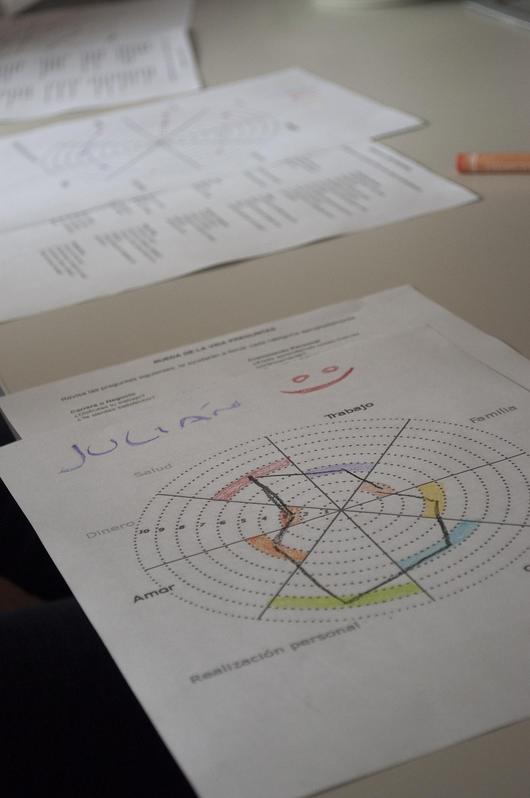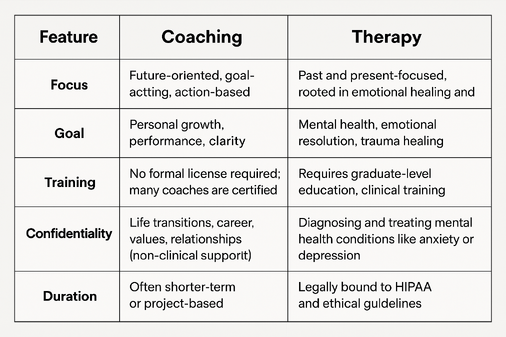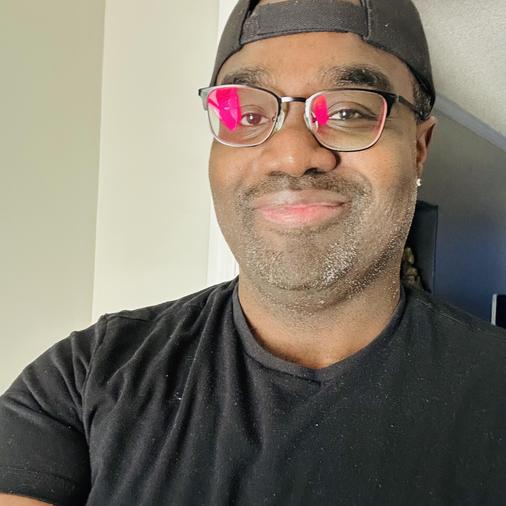Backed by psychology. Enhanced by technology. Centered on you.
There’s Nothing Wrong With You
If your personal life, business, brand, or career looks good on paper but feels misaligned, it’s not failure—it’s a signal. Most people don’t need more strategy.
They need to reconnect with themselves.
We help high-achieving professionals bring their work back into alignment with who they are, their values, voice, and purpose—so their success actually feels like success.
According to research by Grant, Franklin, & Langford (2002), individuals who engage in structured self-reflection—through prompts, journaling, or coaching—experience greater cognitive integration and improved behavioral outcomes.
Why Most Coaching Leaves Something Out
Most coaching programs teach you what to do.
They give you frameworks, strategies, and steps to take.
But they rarely ask:
Who is doing the work?
What does it cost you to keep showing up like this?
And is this still aligned with who you are—now, not five years ago?
You’re not lost because you lack information.
You’re lost because you’ve sat in two very different rooms:
One taught you the technical—the skills, certifications, and systems.
The other taught you through experience—grief, identity shifts, and becoming.
But no one ever showed you how to bring those rooms together.
So what happens?
You build a business that looks right on paper… but feels hollow.
You speak—but the words don’t land like they used to.
You show up—but it feels like a version of you is missing from the room.
And if you’ve built your brand on someone else’s formula, it’s hard to walk away—even when you know it’s no longer yours.
That’s the cost of skipping alignment.
You don’t need more strategy.
You need a compass—something that brings you back to yourself.
The AAA Framework
A simple method for finding clarity, direction, and alignment—starting with who you are.

Anchor
You can’t set a direction until you know where you’re standing.

Assess
Misalignment isn’t failure—it’s feedback. Follow the signals to identify the gaps.

Adjust
Shift your voice, strategy, or brand to reflect what’s true—so your success actually feels like yours.
Limited time offer
Normally $497 →Yours FREE for a Limited Time
This promotion could end anytime—my schedule is filling up quickly.
If you’re ready to reconnect with who you are and realign your next chapter, now’s the time to start.
The Science Behind Core Compass Coaching
The Psychology of Coaching & Identity Transformation
Grant, A. M., Curtayne, L., & Burton, G. (2009).
Executive coaching enhances goal attainment, resilience and workplace well-being.
A randomized controlled study showing that coaching significantly improves performance, resilience, and workplace well-being. Core support for coaching’s measurable outcomes.
Grant, A. M. (2012).
The efficacy of coaching.
Synthesizes a decade of coaching research to argue for its role in enhancing self-regulation, reflection, and identity-based growth.
Kemp, T. J. (2019).
Coaching the leader within: Developing executive identity.
Explores how coaching helps leaders construct internal coherence, reinforcing your model’s focus on self-alignment and congruence.
Mayer, C-H., Surtee, S., & May, M. S. (2021).
Coaching as identity work: A metaphorical exploration.
Presents coaching as a space for personal narrative construction and identity development.
Wilson, T. D. (2002).
Strangers to ourselves.
Argues that much of behavior is unconsciously driven, but can be illuminated through structured reflection—your coaching’s core mechanic.
Grant, A. M., Franklin, J., & Langford, P. (2002).
The Self-Reflection and Insight Scale.
Provides a validated tool for measuring insight and reflection—two critical ingredients in long-term personal growth.
Self-Efficacy, Affirmation, and Boundary Work
Bandura, A. (1997).
Self-efficacy: The exercise of control.
Foundational work showing that belief in one’s ability to act is one of the strongest predictors of behavior and motivation.
Steele, C. M. (1988).
The psychology of self-affirmation.
Presents the original theory behind affirmations as a tool for preserving personal integrity when under threat.
Cohen, G. L., & Sherman, D. K. (2014).
The psychology of change.
Demonstrates how affirmations reduce defensiveness and promote meaningful change when tied to values.
Mikulincer, M., & Shaver, P. R. (2007).
Attachment in adulthood.
Explores how early attachment patterns affect boundary-setting, self-trust, and interpersonal dynamics.
Peterson, B. E. (2017).
The science of boundaries.
Frames boundaries as psychological filters that protect time, energy, and identity.
Cook, L. J., Zuroff, D. C., & Mackinnon, A. L. (2019).
Setting boundaries and preserving self.
Shows how autonomy and boundary-setting increase emotional resilience and reduce relational conflict.
Smith, C. P., & Freyd, J. J. (2014).
The courage to set boundaries.
Focuses on the psychological consequences of avoiding boundaries due to guilt or fear, especially among trauma survivors.
Burnout, Stress, and Emotional Resilience
Maslach, C., Schaufeli, W. B., & Leiter, M. P. (2001).
Job burnout.
Defines burnout through emotional exhaustion, cynicism, and inefficacy—your three-part burnout model echoes this triad.
Leiter, M. P., & Maslach, C. (2016).
Burnout in the workplace.
Explores how burnout evolves in different environments, reinforcing the need for tailored recovery strategies.
Schaufeli, W. B., & Bakker, A. B. (2004) + Bakker, A. B., & Demerouti, E. (2007). (Combined)
Job demands-resources model.
Explains how burnout results when demands outweigh internal and external resources—central to your approach.
van Hooff, M. L., & Geurts, S. A. (2015).
Under-challenge burnout and psychological detachment.
Underscores the risk of burnout from boredom and lack of purpose—critical in under-challenge clients.
Bianchi, R., Schonfeld, I. S., & Laurent, E. (2015).
Burnout as a depressive disorder.
Provides nuance by linking some forms of burnout to depressive features, emphasizing the seriousness of unresolved burnout.
Sonnentag, S., Binnewies, C., & Mojza, E. J. (2010).
The role of psychological detachment.
Clarifies how fatigue can be recovered with rest, but burnout requires deeper work—your layered stress/fatigue/burnout model reflects this.
West, C. P., Dyrbye, L. N., Erwin, P. J., & Shanafelt, T. D. (2016).
Meta-analysis on burnout interventions.
Finds that coaching, structural changes, and ongoing support are among the most effective ways to address burnout.
Mindfulness, Self-Reflection, and Well-Being
Kabat-Zinn, J. (1994 & 2005). (Combined)
Mindfulness meditation in everyday life; Coming to our senses.
Establishes mindfulness as a scientifically grounded tool for reflection, awareness, and stress regulation.
Seligman, M. E. P. (2011).
Flourish.
Introduces the PERMA model (Positive Emotion, Engagement, Relationships, Meaning, Achievement)—a guiding framework for whole-person coaching.
Diener, E. (1984).
Subjective well-being.
Lays the foundation for understanding well-being as multidimensional—emotional, evaluative, and functional.
Ryan, R. M., & Deci, E. L. (2000).
Self-determination theory.
Describes how autonomy, competence, and relatedness are essential for intrinsic motivation and sustainable well-being.
5. Goal Setting and Motivation
Locke, E. A., & Latham, G. P. (2002).
Goal-setting theory.
Demonstrates that specific, meaningful, and challenging goals drive performance—reinforcing your transition from clarity to aligned action.
FAQ
Frequently Asked Quesions (FAQ)
What is Core Compass Labs?
Core Compass Labs is a coaching practice that blends guided reflection, psychological insight, and technology to help people reconnect with themselves and create meaningful, measurable change.
We don’t believe in quick hacks or fluffy advice. Our work is rooted in research-backed practices and built around one core truth:
If your life or work is out of alignment with who you are, it won’t feel real—even if it looks successful.
Using a combination of coaching frameworks, self-discovery tools, and tech-assisted delivery (like our 30-Day Self-Discovery Pathway), we help you get clear on what matters, why it matters, and what needs to change—so you can move forward with intention and confidence.
What is the 30-Day Self-Discovery Pathway—and what happens after?
The Pathway is a guided experience designed to help you reconnect with who you are and what you want—especially if life’s been moving too fast or success hasn’t felt satisfying.
Each day, you’ll receive a short, psychology-backed reflection prompt that builds self-awareness, clarity, and internal alignment. Think of it like tuning into your internal compass—one day at a time.
After the 30 days, you’ll have the option to continue with:
• 1:1 coaching
• A group coaching container
• Or a deeper program that helps you turn insight into bold, aligned action
Whether you pause to reflect or keep the momentum going, you won’t be left without options.
How much time does it take?
Most people spend just 10–15 minutes a day. That’s all it takes to spark real clarity.
The prompts are intentionally short and powerful—designed to fit into real life, even if you’re navigating work, parenting, burnout, or a full schedule. You can go deeper when time allows, but “short and steady” is more than enough to start shifting.
Is this coaching or therapy?
It’s coaching—but not the surface-level kind.
While therapy often looks to the past to process pain, coaching is focused on the present and future—on clarifying your identity, aligning your actions, and designing the life you actually want to live.
The 30-Day Pathway is about uncovering truth and building forward momentum—not diagnosing or treating mental health conditions.
That said, many clients do both, and find that coaching and therapy support each other beautifully.
Do I need to have a big “why,” breakthrough, or crisis to start?
Not at all. You don’t need a breakdown to deserve a breakthrough.
This work is for people who feel like something’s off, even if everything on paper looks fine. Maybe the goals you’ve been chasing don’t feel like yours. Maybe the version of success you’ve built doesn’t feel aligned.
If you’ve been asking yourself “Is this really the life I want?”—you’re already in the right place.
Why is identity such a big focus?
Because if your actions do not align with who you are, they will not feel fulfilling—no matter how successful they look from the outside.
When you’re disconnected from your own values, voice, or truth, you might:
• Chase someone else’s definition of success
• Burn out doing what “works” but doesn’t feel right
• Accomplish a lot… and still feel empty
This isn’t about overhauling your life overnight—it’s about stopping the cycle of outsourcing your decisions and starting to build a life that feels congruent with who you are.
What exactly will I be doing in the Pathway?
You’ll receive one short, structured reflection prompt each day for 30 days. Each one is crafted to help you explore your:
• Core values
• Personal beliefs
• Emotional landscape
• Stories you’ve inherited
• Patterns that shape your decisions
It’s like a conversation with yourself—but with a clear direction. You’ll connect dots you didn’t know needed connecting. And by the end, you’ll walk away with a deeper understanding of what matters most, and what needs to change.
What if I don’t know what I want out of this yet?
Perfect. That means you’re in the right place.
You don’t need a polished vision, a five-year plan, or even a clear “why” to begin. In fact, the Pathway helps you uncover all of that.
We’re not here to help you chase a dream you already have figured out—we’re here to help you pause, reflect, and actually hear yourself again.
Is this for a specific type of person?
Not exactly—but it does tend to resonate deeply with:
• Creatives and entrepreneurs
• Coaches, therapists, and caretakers
• Professionals in transition or feeling stuck
• People who’ve achieved a lot but feel misaligned or as if something's missing
If you’ve ever felt like you’re performing your life instead of living it—or like you’ve built something that doesn’t quite fit—this was made for you.
What’s the science behind this approach?
This isn’t a motivational challenge or a journaling trend. It’s grounded in research from:
• Self-determination theory
• Identity theory
• Mindfulness and psychological flexibility
• Values-based action models
• Coaching and behavior change frameworks
Every prompt and reflection is intentional. We’re not just helping you “feel good”—we’re helping you make meaning, process identity, and take aligned action based on what you discover.
You can explore some of the peer-reviewed research behind the Pathway in the section above—we keep it real and rooted in evidence.
What platform is this hosted on?
We use a secure, private platform called The Lab, specifically built for mental wellness, coaching, and therapeutic support.
It’s both HIPAA- and GDPR-compliant, meaning your data is protected to the highest standards.
Your answers and reflections are completely confidential—they’re yours alone unless you choose to share them in a coaching container. This is your space, and you’re in control.
What happens after the 30 days?
You’ll have options depending on what feels right for you.
Some people choose to continue with:
• 1:1 coaching for personalized support
• Group coaching or workshops to go deeper in the community
• A longer, structured coaching pathway to help you turn insight into identity-aligned action
Others take time to integrate, then return when they’re ready. There’s no pressure, just next steps if and when you want them.
How is this different from therapy or other coaching programs?
This is a really long answer that I’ll try to condense—but there are a lot of key differences and similarities, actually.
Here’s the gist:

Our Pathways programs live in that coaching space—but they’re different from surface-level “goal coaching.” These programs are centered on present-day alignment: Who are you now? What’s asking to change? What kind of life actually feels like yours?
We’re not chasing hustle or performance metrics. We’re working toward congruence—where your inner values and outer actions match, so your version of success actually feels fulfilling.
Can you do both therapy and Pathways? Absolutely. In fact, many people do.
Therapy helps you heal. Pathways help you align.
Do I need to have a big “why” to get started?
Nope. This isn’t about having the perfect mission statement. It’s about finally giving yourself space to ask:
What do I want?
What’s missing?
What would make this feel more like me?
You don’t need a big “why.” You just need to be willing to listen to yourself differently than you have before. We’ll help you find the rest.
What if I start and realize I don’t like who I am?
That’s not failure. That’s a breakthrough.
If this happens, it means you’ve gained enough clarity to see what’s been hiding under performance, perfectionism, or people-pleasing.
This process is not about judging what you find—it’s about greeting it with honesty and self-respect, so you can make choices that actually feel right for you going forward.
What if I don’t finish in 30 days?
No problem. This isn’t a race—it’s a reflection.
Life happens, and part of what we’re practicing here is permission: to move at your own pace, to pause when needed, and to come back when you’re ready.
Every prompt stays available to you. You can revisit them, skip around, or sit with a single question for a few days. Progress isn’t about speed—it’s about presence.
What if I’ve done other programs and they didn’t work?
That’s exactly why this exists.
You’re not broken, lazy, or unmotivated. More often than not, those other programs failed because they handed you someone else’s blueprint—someone else’s values, goals, or pace—and expected it to magically fit your life.
What makes the Pathways programs different is where they begin:
With you.
Not with hustle culture.
Not with rigid morning routines.
Not with mindset mantras or toxic positivity.
This work is built on structured self-inquiry, rooted in coaching psychology and identity theory. Instead of pushing harder, we help you pause and ask better questions—about who you are, what matters to you, and what kind of life feels true.
You do not need to contort yourself to fit another system. We’re here to help you design your own.
This is not about fixing you. It is about finally making space for the version of you that’s been buried underneath all the expectations and noise.
What if I uncover something I’m not ready to face?
That’s okay. Truly.
This work is designed to meet you exactly where you are—not to push you past your limits, but to gently invite clarity, awareness, and healing. You’re in control of the pace, the depth, and the direction. Nothing is forced, and nothing has to be answered before you’re ready.
If something difficult surfaces, you have options:
• Pause and return later. Growth doesn’t have a timer. You can take a breath, gather yourself, and revisit when it feels right.
• Skip a prompt entirely. Not every question needs to be answered right now—or ever.
• Use the insight as a signal. Sometimes discomfort is a doorway. What feels hard to look at is often where the most meaningful transformation begins.
That said, avoidance and safety are not the same thing.
There may come a time when what you’re not ready to face is exactly what’s asking to be faced—whether through the coaching process, in therapy, or with support from both. That’s not a flaw. That’s your inner wisdom pointing to what matters.
This process isn’t about forcing breakthroughs or fixing what’s not broken. It’s about creating space for the truth to unfold—and then honoring it with courage, care, and the right kind of support.
You are not alone in that.
Can this help with burnout, anxiety, or decision fatigue?
Yes—while it’s not therapy, this work supports many of the underlying causes of those feelings.
Burnout, anxiety, and decision fatigue are often signs that:
• Your actions are out of alignment with your values
• You’ve been navigating life in survival mode
• You haven’t had space to process what you really want
The Pathway helps you slow down, get clear, and reconnect to what actually matters—so your energy and decisions aren’t driven by urgency, fear, or autopilot.
👀 Still hovering over the button? 👀
Maybe you’re still not sure if you’re “ready.”
Maybe you’re wondering if this will actually help.
Maybe you’ve signed up for things before… and didn’t finish them.
We get it.
But let’s be honest:
• You’ve been carrying the same questions for a while now.
• You’ve tried pushing through.
• You’ve tried waiting for clarity to magically arrive.
• And you’re here. Reading this. Still searching.
That’s not an accident.
The 30-Day Pathway isn’t a productivity hack or a mindset makeover. It’s a place to finally pause, tune into yourself, and hear what your inner compass has been trying to say for a long time.
This isn’t about becoming someone else. It’s about becoming more of who you already are.
For $3, you get 30 days of structured, meaningful self-reflection. You’ll walk away with clarity, language, and insight—even if you don’t do it perfectly.
And if all it does is help you remember who you are in a world that keeps telling you to be something else… isn’t that worth starting?
Ready to Begin?

Anchor
Reconnect with Who You Are
Before you make any changes, you need a clear signal. These guided prompts help you root back into your core identity—your values, your inner compass, and the deeper truth that’s been hard to access in all the noise.
Assess
Spot What’s Off & What’s Missing
Once you’re anchored, you’ll begin to recognize the misalignments—what’s draining you, what feels hollow, and where your actions don’t match your truth. You don’t need to burn it all down—just name what’s not working.


Adjust
Start Making Moves That Feel Like You
You’ll identify one or two areas where you’re ready to shift. We’re not chasing productivity. We’re creating congruence. The smallest aligned actions often lead to the biggest clarity.
30-Day Self Discovery Pathway
$1,500 of value
for only $497
FREE!
This promotion may end at any time.
Dion Leadership (2020) found that 94% of participants reported increased overall confidence as leaders due to leadership coaching.

My Mission
Hi, I’m O.J. Spikes, a Mental Wellness Coach and Founder of Core Compass Labs
I help coaches, consultants, and creatives design work that reflects who they are—not just what they do—by blending deep self-awareness with actionable strategy.
After years of chasing success through systems, scripts, and surface-level solutions, I realized what was missing wasn’t knowledge—it was alignment. I had the tools, the training, the ambition… but not the clarity. And without that, even my “wins” didn’t feel like mine.
I hold a master’s degree in Industrial-Organizational Psychology and a master’s in Vocal Pedagogy, and I’m a Board-Certified Coach through the Center for Credentialing & Education. But none of those credentials meant much until I aligned them with who I really am—and helped others do the same.
That’s why I created Core Compass Labs—not as another hustle strategy, but as a reset point for people who want to reconnect with what actually matters. My work combines psychology-backed reflection, real-world coaching methods, and tech-assisted tools to help you tune in to who you are, identify what’s out of sync, and make bold moves rooted in truth.
I believe confidence doesn’t come from just pushing harder—it comes from congruence. When your values, voice, and work finally line up, everything changes. You stop performing and start showing up as yourself.
Whether you’re starting over, pivoting, or refining what you’ve built, I help you realign from the inside out—so your work not only succeeds… it resonates.
Stay up to date!
Let’s Stay Connected If anything on this page resonated with you, I’d love to keep in touch.
I won’t flood your inbox, sell your info, or hit you with constant promos.
But every now and then, I’ll send you something that invites you to pause, reflect, and reconnect with yourself.
A moment of clarity. A new insight. A little nudge back toward alignment.
Sound fair?
Drop your name and email below. Let’s keep the conversation going.
We hate spam too. Unsubscribe at any time.

